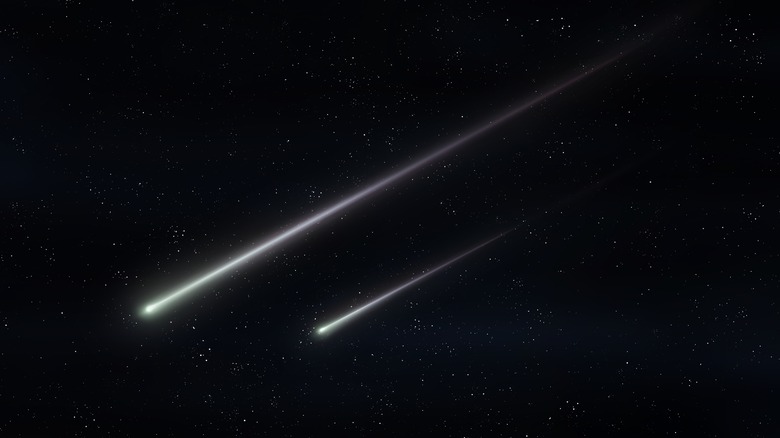A Meteorite That Landed In England Might Answer One Of Earth's Greatest Questions
When Earth was a young planet, it was scorching hot — so hot, in fact, that much of the planet was molten, according to the National Oceanic and Atmospheric Administration (NOAA). As it rocketed around our solar system, crashing into other masses, Earth's top-of-atmosphere temperature soared to over 3,600 degrees Fahrenheit.
Scientists believe that early Earth was too hot to provide a habitat for much in the way of raw materials for life such as water, per the BBC. So how did Earth go from such hellish heat to a blue-green orb blanketed by ocean tides?
One previous theory was that icy comets rained down upon Earth at some point in the planet's history, according to the BBC. However, others cast doubt on that theory; the comets' chemistry would have been pretty different from the water that today makes up roughly 70% of Earth's surface. So what first brought water to Earth?
A clue from above
Scientists believe they've found a clue that literally fell out of the sky one day. A carbonaceous chondrite, a type of meteorite, happened to whizz down and embed itself in pieces around the town of Winchcombe, which is in Gloucestershire, England, last year, per the BBC.
Upon closer examination of the meteorite pieces, scientists were able to determine that the meteorite held water that closely corresponded to the chemical structure of the water on our own planet. The meteorite pieces collectively weighed over a pound, according to the BBC. And they were as uncompromised and as much in their original condition as it's possible for meteorite chunks landing on Earth to be, per Science News.
That's because scientists were able to gather the meteorite pieces in under 12 hours after they collided with the surface of our planet, according to Science News. Researchers then tested the meteorite pieces in a lab, heating them up, peppering them with electrons, X-raying them, and blasting them with lasers to test their composition.
Familiar waters
Through those tests and by analyzing video from meteor-tracking cameras around the world as well as doorbell cams from locals in the U.K., scientists ascertained that the meteorite was that rare specimen known as a carbonaceous chondrite, per Science News. They were able to trace its origins to an asteroid orbiting Jupiter, from which it broke off roughly 300,000 years ago.
The meteorite was approximately 11% water. The water itself contained deuterium, a heavier type of hydrogen, with the ratio of hydrogen to deuterium coming very close to the ratio in our planet's atmosphere, according to Science News.
"It's a good indication that water [on Earth] was coming from water-rich asteroids," London Natural History Museum scientist Ashley King told Science News. Meteorites like the one found in England have to move fast in order not to disintegrate, but if they did make it here in Earth's past millennia, that would explain how our planet eventually got water. What's more, those meteorite fragments remain intact, so scientists will keep on studying them until they unlock more secrets of our solar system.


